suzemo
I love mustelid haberdashery, vinho verde wine, and wensleydale with fruit.

Fun story, concentrating on werewolves. I think my favorite part of the story was the different classifications of werewolves (other than Bob's "There wolf" joke, which is my favorite part of the whole book).
It's nice to re-read through these early stories and see some of the overall arc that is developed more fully through subsequent work.
What's not nice is that Harry's sexism (misogyny) is even more irritating, because I'm already annoyed with it. The infantilization of Karrin through his eyes is just really irritating.

I've struggled to read this book for months, and I don't think it was because of the book, but because I was not in the right place or mind to read the book, honestly.
This is one of the older, classic post-apocalyptic novels, and I'm not sure why I didn't read it in high school, when I was in the throes of all of the classic PA/Dystopian books. The book is comprised of three parts/stories, with each story taking place hundreds of years after the previous.
We start at an abbey set in the future, a future where we have quite literally bombed ourselves (collectively - humanity) back into the dark ages. This abbey's mission is to preserve knowledge from before the "Deluge" (the fiery world-wide atomic war). I found it fun, how, in this new world, knowledge is considered evil, because advanced knowledge and science "brought" the atomic wars. It reminds me how computer ("thinking machines") are banned in Dune (for much the same reason). A monk finds a fall-out shelter belonging to the Saint Leibowitz (the Abbey/order's founder) and moderate hi-jinks ensue.
Hundreds of years later, the story again takes place in the Abbey. Civilization has advanced, we now have kingdoms appearing and warring with each other, and the relative of one of the leaders has come to the Abbey to study (he is obviously a scientist) and electricity begins.
And hundreds of years later, the story is again at the abbey, this time in the far future, where the space age reigns. There are extra-planetary colonies, advance science, and again, nuclear war. The monastery is still on a mission to preserve knowledge, and sends a colony ship off of the planet to preserve it from a likely annihilation. The rest of the short story deals with the monastery's leader struggling with a nearby euthanasia camp and ends with his witness of what he thinks of as a miracle (a mutant, without Original Sin, giving him Communion).
The story has a lot of themes and tidbits that circulate through the three stories, and I found the book both depressing and darkly hilarious. The idea that we are doomed to repeat ourselves, doomed to bomb ourselves back to near oblivion whenever given the chance is both sad, and something I could not quite dismiss. There is enough realism in this book to make it very believable. On the other hand, some of the humor involved - it's funny, but sadly/darkly funny. The poor monk, Francis, dealing with his discovery of the fall-out shelter, the fact that the story involved gets blown out of proportion, and then is not believed cracked me up, but made me feel sorry for him at the same time
The last story - involving euthanasia and the abbot, was rough. I grew up Catholic (though I'm not a believer), and I totally got where the abbot came from with his resistance to euthanasia, but the lack of humanity in opposing someone ending their suffering (I am pro-euthanasia), was a bit harsh. Not that it mattered, with everyone dead.
But this book does what all of the best sci-fi does. It takes ideas and beliefs and plays with them, winking and nodding, showing different sides and trying to make one think or understand on a different level, all while being scarily realistic, but not trying to read deep. On the surface, it's a collection of three short stories about a monastery, underneath, it is so much more.
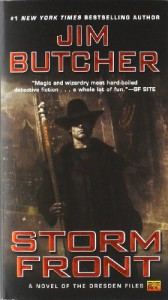
Still entertaining, I enjoy re-reading this book, especially after having read through the series up to what is currently published.
I enjoy refreshing my memory regarding his earlier cases, and even though the book feels a bit slow (since everything is new and must be explained for adequate world building), it's still a solid little book.
Wizard Harry Dresden is a police consultant and they bring him in on a grisly, magic-involved murder, while he has a client whose case may or may not be involved with the murder. This book revolves around Johnny Marcone, Victor Sells and ThreeEye "drug" and introduces Morgan (who I adore) and Susan Rodriguez.
Fun times.

Just in time for Christmas! This is a delightfully irreverent look at Jesus H. Christ, through the eyes of his childhood friend, Biff.
It covered Jesus through his childhood and adolescence (*especially* his childhood and adolescence!) to his death on the cross.
I found it absolutely hilarious, and I loved some of the detailed tidbits that Christopher Moore threw in there. There's a ton of awesome jokes - obvious and a little more subtle that make this a great read/listen.

This is a retelling of Hamlet, beautifully narrated by Richard Armitage.
I know Armitage has been on stage in Hamlet before, and since it is one of my favorite Shakespearean pieces, I decided to give it a go, even though I was not all that thrilled with the authors' prior work, MacBeth.
Armitage did such a great job, that I actually managed to like the work more than I think I would have without his narration. I still really enjoyed the work, and I enjoyed the different viewpoints and plot points expressed in this novelization.
I liked the change in characters, the outright choice of making Hamlet pretending to be insane (instead of playing the "is he or isn't he" bit out). I liked the political intrigue and how they just fleshed out the characters in a different way than you see in the Shakespeare play.
The afterward was good, too, I really like the authors giving a bit of history and rationale behind their choices.
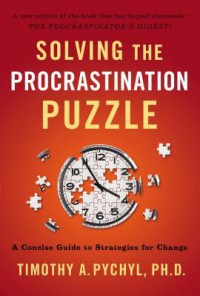
This is a pretty solid little "read" (I had it on audiobook).
As a chronic procrastinator, I am always looking at ways that I can break this bad habit, and what I really liked about this is that the author actually uses real research to show how and why procrastination happens, and some strategies that one can use to help fight it.
It's not earth shattering, but very useful, I think.
I'll be checking out his blog and trying to use some of his recommended strategies.

I have an immense love of post-apocalyptic fiction, especially the classic stuff. I've been around the block enough not to be terribly surprised by events, but this book still hit me pretty well.
I think that this book is delightfully nuanced - it doesn't club you over the hows, but lets them develop nicely. Everything we had under control (farming carnivorous decorative plants, the space and weapons race) suddenly goes wrong, and we're left in a world where everything goes badly, because of what could be construed as simple coincidences.
The main character was solid, the protag's love interest (I suppose she should be another protag, but this book was written and took place in the misogynistic past) was also good and strong.
I absolutely loved the imagery of the book. The triffids were just plants, carnivorous plants to be sure, but still, just plants. They were the bad guy without having evil intent. So when you see a triffid standing over the body of a boy, it makes the scene that much more sinister.
As always, one of my favorite things about PA lit is looking how people survive, and how groups make it through a bleak landscape. With most of the population being blind, there was a different twist to this book, but one I found to be utterly believable.
I really, really liked this book. It was well paced, well written, and overall just very, very solid.
 1
1
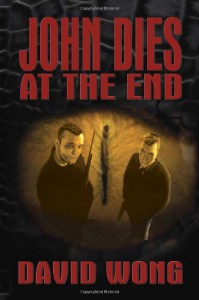
I have this mantra in my head: "try to be positive, try to be positive, try to be positive"
But it's failing.
I hate this book. I hate this book for ever having been written. I hate people for liking this book and giving it good reviews. I hate the author for having written this book. But mostly, I hate myself for reading this book.
And I have a really strong "What the holy hell!?" reaction to those who love this book. Every five star review just leaves me baffled.
David Wong is a not-terrible writer. I like some of his articles at cracked.com, so I know he's capable of writing a decent article, at least. I went into this book blind. I didn't read any reviews or spoiler myself about it, and therefore I did not have any preconceived notions of what might happen. I do know that there seemed to be a lot of extreme opinions from my friend (love/hate), so I did have expectations that it would be complicated.
But it wasn't. It's a stereotypical "immature boy" book full of penis jokes, farting, "hilarious" dog diarrhea jokes and the like. It is horror/gore porn with a dash of scifi/fantasy. It was dumb, incohesive and just awful. It rambled and does not have any humor that could be remotely compared to something like The HitchHiker's Guide (which is what I read... somewhere). I can't even give it the "it's just mindless stupid for fun" good rating, because I love lots of mindless (or even downright bad) books, but this one? No.

Andre Norton's The Beast Master was a bit of an inspiration to the movie of the same name, but please, do not think these are the same thing. The idea of communicating with animals is where the similarities start and end. Or rather, the idea of a man running around communicating with animals is where it ends. The book is hard sci-fi, there is not a scrap of the fantasy-ish world of the movie.
This book is a hard, pulpy sci-fi novel with other planets, futuristic weapons, aliens and all of the good stuff you expect from older works, and it feels very, very dated.
I'm not saying I hated it, I just really didn't like it.
Hosteen Storm is our savage noble (no, seriously, he's Navajo - she uses "Amerindian" as well, which adds to the dated feel), who is a veteran commando with several animal team members. He's got a couple of meerkats, a puma, and an eagle, and he has settled on another planet not so different from his native Terra, where he can put his talents to use. Oh, and hunt down and kill another man, for vengeance. You don't find out the story until the end (the why of the hunting down and/or what really happened).
In the meantime, he wanders as a colonist, working as a cowboy (no, really!), and runs amok of aliens, including the Xik, who are super bad aliens.
There's a whole lot of stereotype (beyond the whole Noble Savage) with regards to how people act, and how colonizing (and the old west?) should be. It was just really, really tedious to get through for me.
In the end, we're all good (minus one meerkat, which I knocked half a star off for), so the series can continue, but it just felt very forced. And dated (did I mention the dated?). I just didn't enjoy it. I've read a few other of Norton's works and she's always been hit and miss for me, so I'm not terribly disappointed.
 1
1

I am an utter sucker for re-telling of fairy-tales, or using established fairy-tales in new and interesting ways. This book is the first of the 500 Kingdoms series by Mercedes Lackey and I've heard mixed reviews on them, but I always like to start with the foundation book.
This particular book works with the Cinderella trope, and uses Elena (our would-be Cinderella) to show how something known as the "Tradition" uses forces to try to pigeonhole certain people into stereotypes or tropes and how the magic system in this world works. Elena cannot be Cinderella (no prince!) so she is taken by her Kingdom's Fairy Godmother to be trained to be the next Godmother.
This is lighthearted and fun, without being overly silly, and I really like how the world-building was set up and the plot moved along. I'll probably continue with (some) of the works in the series, because they are right up my alley.
 1
1
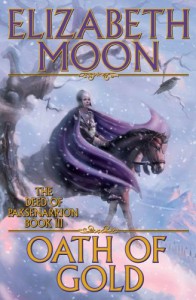
The final book of the Deeds of Paskenarrion series, this covers Paks from the time she left Fin Panir, a "coward" unable to face anything and finds herself back with Master Oakhollow in Brewersbridge. We then get to go along with her adventures with the elvish and other adventures as she evolves into her paladin's form and then undertakes the quests she must complete.
I think the only part of the book I found mildly annoying was that as soon as Paks figured out what her "quest" was, I had it solved, and I like my books to be a wee bit more difficult than that.
But we still had the fun adventuring and action and I found it a fulfilling final installment of a trilogy I very much enjoyed (except for the 5 days of torture bit, I get why the author decided to have it happen, but I wasn't so sure it needed to happen)
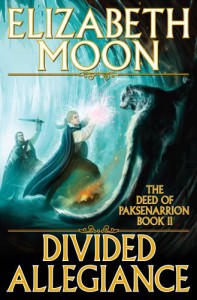
The second of the Deed of Paskenarrion trilogy, I find it even better than the first. Paks is still growing up and going through trials, and she's learning to think on her own (thank the baby monkey).
The plot is fast pace and entertaining... It does feel a bit dated, but not so much so that I find it problematic. If anything, it's just not the current "style" of fantasy being churned out, but it's nice not to read anything gritty and horrible (at least, not constantly horrible). It is the middle of the trilogy, following Paks from when she left the Duke's service in the first book through the discovery (and what happens after) of Luap's stronghold.
While obviously a middle book, it's an entertaining middle book, not dragging at all. Very fast paced, very entertaining and very interesting. This is one of my favorite trilogies and I keep kicking myself for not having read it years and years ago.

I purchased this book first, then realized that it was the second in the series thanks to Neil Gaiman's intro, and listened to the first one before moving along to this one.
I don't know how necessary it really was, as the main characters in the first book are only secondary characters here (and not really very critical). Alec, one of the main characters in the first book is the crazy Duke who wages (financial) war on his family thanks to some unresolved issues he has with his sister. After breaking his sister's family's bank, a resolution is reached where his niece is sent to him to be trained as a swordsman.
She must now live at the periphery of society instead of taking part in it (much to her initial annoyance) and learns to live as the gender bending family member of a crazy rich (and powerful) man.
She makes friends, engages in bits of the machinations of the nobility, and in the end is the duchess.
I didn't really like this novel as much. I don't know if it's because I was already bored with the style of storytelling from the previous work (the writing, in and of itself is decent enough), or what, but I just wanted to get through the book. Everything Katherine (the niece) gets or does seems to be at the whims of the males or with their "help" - so instead of having a strong female character, or at least something that could have been made into an interesting look at gender politics, we have an almost boring story of "how female characters get pulled around and everything they do or get is through male agency"... The sexuality and debauchery of the first novel is here, again, but doesn't get terribly interesting (indeed, one of the most important plot points is a rape used as a power play).
The ending was super disappointing and anticlimactic. Everyone gets their happy ending without much difficulty and everyone rides off into the sunset happy (or gets their comeuppance, whichever we're supposed to want).
All in all, a bit disappointing. I think if I wanted a seriously mindless easy read, this is the way to go, but that's not where my head-space was.
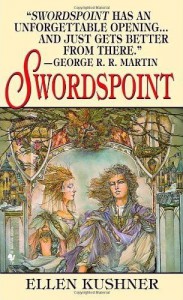
If I could sum this book up in one statement, it is:
This is one of those books I could discuss often and probably change my mind about very easily.
Isn't it funny how you get around to reading some books by accident? I picked up the sequel to Swordspoint during an Audible sale. I was excited to get to it, because Neil Gaiman produced? Helped to produce? it. Neil is an excellent audiobook narrator and an audiobook afficionado, which I find kind of awesome, and he is helping to bring some of his favorites to audiobook.
So I picked up this book, Gaiman junkie that I am, and during the introduction, he drops that this is the second in the Riverside series, so back to Audible I go to get this.
And I listened.
It's not my preferred style of audiobook, with multiple narrators. I'm a little peeved that the multiple narrators are not used throughout the book, but only during passages deemed important or those with heightened tension. You have Kushner giving the audiobook it's "regular" read for most of the book (and she is good), but then the characters have their own voices. It's just... odd. And I don't like the sound effects (swords clashing, walking, horses, shouting). I eventually got used to it, but I would not recommend this book in this format.
Onto the actual substance of the book - I don't think this is fantasy, strictly speaking. It's much more historical fiction/romance set in an imaginary time & place. There's no magic or anything otherwordly that distracts from the main story line.
We have the set up of the nobleman/aristocracy who run an unnamed City and the people who live in it. One of the main characters, Richard, is a swordsman, which nobles will hire out to duel, challenge others on honor, be honor guards for weddings, etc.
Richard is living in the poorest area of the city with his lover, Alec. He is engaged by noblemen to do different killings/duels.
The other part of the story line is the shenanigans of the noblemen and their maneuvering around the political and social sphere.
The world building was really good. The writing was solid and very easy to follow. I can't say that I just adored this book, but I was interested in it, and the political machinations of the characters and how Richard was caught up in it, but I was not interested in any of the characters (well, except maybe the Duchess). Richard is a sociopath who is in love with Alec, for no reason I can discern, and Alec is a troubled, cynical, and really annoying youth who I neither like nor care about.
I did like the politics and social maneuvering, and I think this book lives up a bit to the idea that it's an Austen-esque take on a fantastical society. It gives the foibles, humor, mockery and silliness of antiquated situations, which was cute (best word I can think of there).
I was a little bit peeved, though, because while the book was very open with male non-heteronormative behavior (apparently homosexual behavior among men was nothing to raise an eyebrow at and quite common), you don't see any glimpses of these kind of relationships between women, and women were still stuck subservient in a very strong patriarchal system.
I had a hard time wondering why we couldn't have stronger women, lesbian relationships, or a more egalitarian system while we're totally accepting of (male) homosexual behavior, and from a woman writer, no less.
I don't know, the story was interesting, interesting enough that I was curious about what happened next and immediately started The Privilege of the Sword, and I did like it overall, I think.
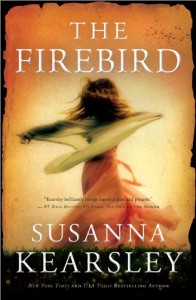
The second in the Slains series (I'm not sure how many there are going to be), this is a continuation of the first book, The Winter Sea.
In this novel, we experience the same sort of modern/historic double story, with Nicola and Rob as our modern day couple (who, of course, aren't together, but, spoiler alert - will be, eventually, we all know it). Nicola is an art historian/dealer with a Russian history (her grandfather and mother escaped the USSR). Rob is a Scottish policeman/constable? (I'm already getting fuzzy on the details). But wait, they met while taking part in a study about psychometry. You see, they can see into the past. So we're psychics. Rob is more powerful, Nicola has to actually touch objects to see their pasts.
She inadvertently touches something that gives her a flashback of Anna, the "abandoned" daughter of the first Slains novel, who would be part of the romantic duo we'll focus on in the past. In the historical flashback storyline, we're treated to St. Petersburg during the reign of Peter the Great and Catherine I and the marginal part that Russia played in the Jacobite rebellion. Anna (of course) meets a dashing rake, and navigates the society among the Jacobites that have fled to Russia. Cue angst among misunderstood characters.
I am an utter junkie for anything Russian, and I'm just going to say that I'm disappointed. There is lot less historical "meat" in this novel than there was in the first one, with most of the novel just being about Anna maneuvering about in life with a couple of adorable plot!twists! and more of the "fade to black" romance that I really don't enjoy.
It's still a solidly written book, and I think the biggest issue I honestly had was that the narrator for this novel (audiobook) was not nearly as good as the one for the first one.
All in all, I'm pretty done with this series. I picked up The Firebird because Russia. And I got the first book so I could get the background before checking out the second, but I don't find myself compelled to continue.

The only way for me to cover how I feel about this book, is to bring up a lot of spoilers, so you've been warned.
I picked up Kearsley's The Firebird thanks to an Audible sale, and I was about to start it when I decided to check out some basic information about it, which is when I found out it's the second in a series (the Slains), so I went back to pick up the Winter Sea first.
The Winter Sea is a frame story, taking place in modern day Scotland as a historical novelist (Carrie) researches the details about the Jacobite shenanigans of 1708ish. She decides to tell the story through the point of view of a minor character, Sophia, who has come to live at Slains as an orphaned distant relation of the family that lives there.
So the generic good and bad, before I get into the spoilery details:
The narrator for this audiobook was absolutely fantastic. One of the best I've ever listened to, and she did a great job with the accents and distinguishing between the different characters. She also spoke fairly quickly, not droning on... fast enough that I didn't speed it up (I listen at 1.25 speed, normally).
The history is solid and well written, though we're told, rather than shown any of the major historical events. However, I like reading historical fiction, because it usually gives me a nudge to reading up and learning about events I was previously unfamiliar with.
The writing can be a bit cheesy and repetitive (there are a lot of similar/same names which can get confusing) but I found the world building to be very atmospheric.
The characterization, particularly with the modern world, was very weak. I cannot fathom why the modern day characters are in a "relationship" or where they are coming from, because they're very secondary to the historic part of the story. It felt, very strongly, that the modern day protag was only there as an actual extension of the author, which made my eyes roll more than once.
And this book is absolutely a romance, but one of the really weak-sauce ones, where we fall into each others arms, and cue fade to black. There are no sex scenes, and nothing remotely interesting. I prefer my romance trashy, so on that front it was disappointing (not so bad, if you are like me, and only thought of the novel as a historical fiction).
So onto the bad, which involves some serious spoilers:
The novel is based on genetic memories. The author-protag starts hearing voices and it's the people of the past telling their stories, which she writes down. When she goes to do the research, she discovers that the details she can verify are all 100% true, without her having prior knowledge. Which, I just can't get past that bullshit.
Even better, writer Carrie goes to visit a local doctor whose hobby is local history, and after telling him about the voices in her head, he doesn't immediately think she's crazy either. I just, I couldn't totally get past that.
The other thing that, while technically isn't awful, still feels utterly squicky to me was how the (actual) author intertwined the story lines. Carrie is the descendent of Sophia, who had children after traveling to Ireland. Well, Sophia left her first child, Anna behind in Scotland. Carrie's love interest, Graham, is hinted to be descended from Anna. So yes, nearly 300 years of intermarriages with others makes everyone not-so-closely related, but Carrie sighs with happiness over having "come home," which means boinking someone that shares a direct ancestor. And I just can't find that romantic.
So overall, solid little book, worth the credits I spent, and I will be moving onto The Firebird






 1
1